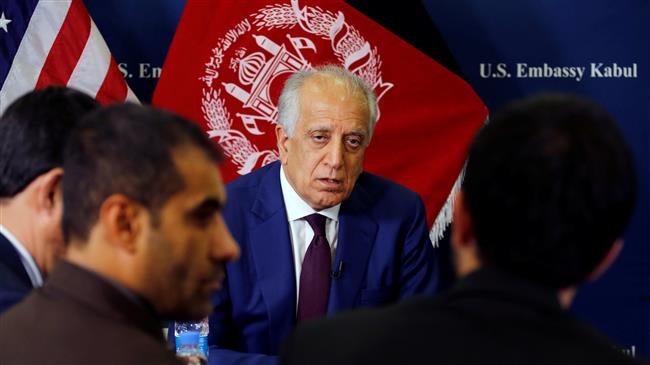Alwaght- Afghanistan's Taliban said it has reached no agreement with the US after three days of talks in Qatar.
The Taliban leaders met US special envoy Zalmay Khalilzad at their political headquarters in Qatar last week for the second time in the past month, said the militant group’s spokesman Zabiullah Mujahid on Monday.
"These were preliminary talks and no agreement was reached on any issue,” Muhahid added.
The statement came a day after Khalilzad said he hoped to cut a peace deal with the Taliban by April 20, 2019, the date set for presidential elections in Afghanistan.
The militant group, however, said they had not accepted any deadline set by Washington.
Another senior member of the Taliban said Khalilzad’s strategy to declare a deadline showed how desperate Washington was to withdraw foreign forces from Afghanistan.
“Taliban leaders have not agreed to any deadline because we are winning on all fronts,” he claimed.
The Taliban also warned the US against sending mixed messages that they say could muddle the peace process. The group was apparently referring to an earlier statement by Khalilzad that said the Taliban believe they will “not win militarily.”
“We were astonished to see Khalilzad’s statement in Kabul on Sunday. He wrongly quoted us, saying that the Taliban admitted that militarily we would not succeed,” said a senior Taliban member in Afghanistan.
The United States appointed Khalilzad, former US ambassador to Iraq and Afghanistan, as the special envoy to the country in September to lead the reconciliation efforts with the Taliban.
Khalilzad has since been traveling to the region for discussions with the national government and the Taliban to try to renew the peace talks.
Two senior US officials also confirmed that the second round of talks ended last week, and that the Taliban expected Khalilzad to visit Qatar for a meeting before the end of 2018.
“The second round of talks went on for three days. This clearly proves that both sides are exercising patience and caution during their diplomatic engagement,” a US official told Reuters on condition of anonymity.
The group’s five-year rule over at least three quarters of Afghanistan came to an end following the US-led invasion of the country in October 2001 but 17 years on, Washington -- having failed to end Taliban’s militancy campaign – now seeks truce with the militants.
The Taliban have strengthened their grip over the past three years, with the government in Kabul controlling just 56 percent of the country, down from 72 percent in 2015, a US government report showed this month.
The Taliban issued a statement earlier this month, demanding the lifting of sanctions against its leaders; the release of prisoners and the recognition of their office in Qatar.
Kabul, however, strongly oppose to any recognition of the Qatar office, which was established at the request of Washington in 2013, to "facilitate peace talks."
Diplomats and political analysts in Kabul have urged Khalilzad to include Afghan politicians and officials from neighboring countries such as Pakistan and Iran in the process before a third round of talks.
“Khalilzad's hasty approach could lead to an epic disaster,” Reuters cited a Western diplomat in Kabul as saying. “The Taliban would trust him only if he did not speak on their behalf."



























